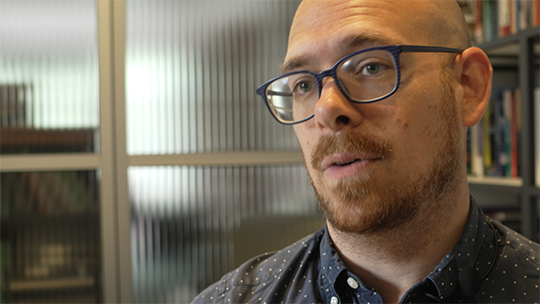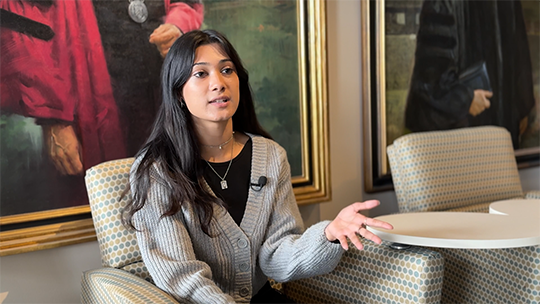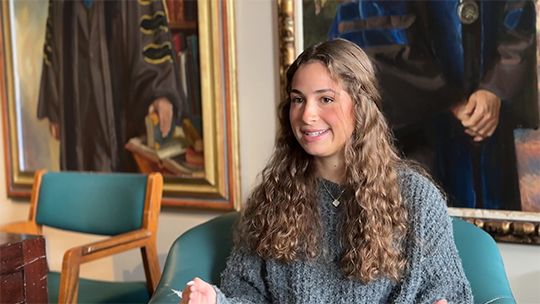Generations of silence are giving way to spoken truth through a new project at Rice University. In collaboration with the Texas Tribal Buffalo Project (TTBP), a nonprofit founded by Lipan Apache leader Lucille Contreras to restore Indigenous foodways and culture, Rice’s Weston Twardowski and a team of students have launched an oral history archive to preserve the lived experiences of Native Texans.
“We conducted a survey that had never been done before for Texas Indigenous lineal descendants,” said Contreras, founder and CEO of TTBP. “It covered cultural, financial, linguistic, spiritual and educational topics along with sharing who was willing to share their stories.”

The project titled “Living Memory: An Oral History Project to Strengthen Native Sovereignty in Texas” began in fall 2024 as part of the Center for Civic Leadership- funded Houston Action Research Teams (HART) program. Guided by Twardowski and TTBP, the project has already collected more than 50 hours of interviews, many from elders who had never before spoken publicly about their Indigenous identities.
“I started working with Lucille about two years ago,” said Twardowski, associate director of the Center for Environmental Studies and the Sustainability Institute’s EcoStudio. “We collaborated on a couple of different potential food initiatives, and I invited her to speak in some of my classes. We just started to build a partnership.”
That collaboration evolved into this full-scale oral history initiative, grounded in methods designed to honor Indigenous storytelling traditions.
“To work with Weston and his students has been really wonderful,” Contreras said. “So many of our people have experienced the loss of land, language and culture. This has never actually been acknowledged by the state of Texas before. These stories hold treasures of information that help tie us to our past. Our ancestors will also help lead us into the future.”

Through Zoom interviews and phone calls, students have gathered testimonies that range from childhood memories and cultural practices to contemporary challenges faced by Native Texans.
“We have always been here,” Contreras said. “And the work we’re doing, including this oral history archive, is helping ensure our people’s stories aren’t just remembered. They’re recognized.”
“A lot of these older people, they’ll look at us and midinterview they’ll say, ‘You know, I’ve never actually said that out loud,’” said Isabella Bourtin, a junior majoring in health sciences. “Or they’ll say, ‘I’m so glad I can tell you this. I’ve never just sat down and told my life story to someone.’”
Bourtin, who is Native herself and founded Rice’s Native American Student Association, said working on the project has been emotional and empowering. She joined after hearing about the opportunity from Twardowski.
“Cultural preservation and revitalizing culture is bringing back what has been lost throughout generations of trauma,” Bourtin said. “So being on this project, which is providing a place to preserve these wonderful stories and traditions in a more concrete form, it’s just so beautiful.”
The project is designed to be community-owned and culturally responsive. In addition to gathering oral histories, students are building a digital archive that will be housed at the Woodson Research Center in Rice’s Fondren Library. The archive will also include a report synthesizing the most pressing needs voiced by Native Texans and potential paths toward sovereignty and resilience. The digital archive is expected to be publicly accessible later this year.

“We really wanted to make sure that when we started this research project we were doing so respectfully and thoughtfully in conversation with our partners, knowing what TTBP’s goals and needs were and really meeting that,” Twardowski said.
The project is also one of the first comprehensive attempts to document Indigenous identity in Texas through oral histories. For student researchers like Annesha Dey, a junior majoring in philosophy, that novelty comes with responsibility.
“It’s data that’s disseminated and owned by Native Texans for Native Texans to give them the voice by telling their stories,” Dey said. “It’s basically a large collection of many experiences. In each of those experiences, people talk about the differences between what it looks like to be Indigenous in Texas.”
Dey and Bourtin were part of the team that presented the project at the HART showcase at the end of the spring semester. By then, they had completed 57 hours of interviews.
“I was just so incredibly proud because we’ve really put our heart and souls into this project,” Bourtin said. “It is so meaningful to every single one of us.”
The next phase of the project will focus on identifying common themes across interviews with the goal of helping Indigenous organizations like TTBP better advocate for community needs.
“What are some of the challenges we’re hearing?” Twardowski said. “What are some of the exciting things that we’re seeing as places of flourishing for Indigenous peoples across the state today?”
Contreras said the students’ work reflects a level of respect and care that resonated deeply with those whose stories have been documented.
“They have taken this project to heart and really tried their best to cultivate the relationship with who they are interviewing from the very beginning,” Contreras said. “Their care and authenticity has been so helpful for our Texas Indigenous lineal descendant community.”

